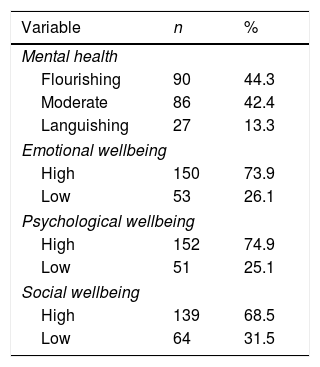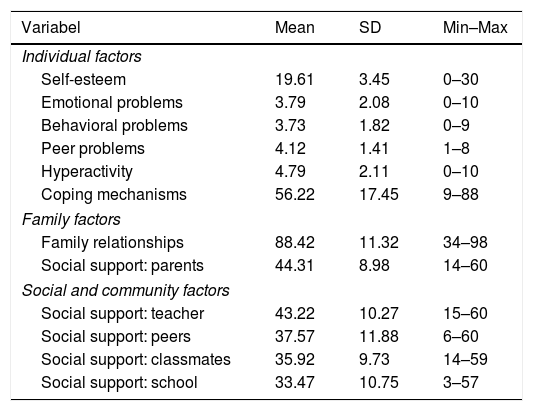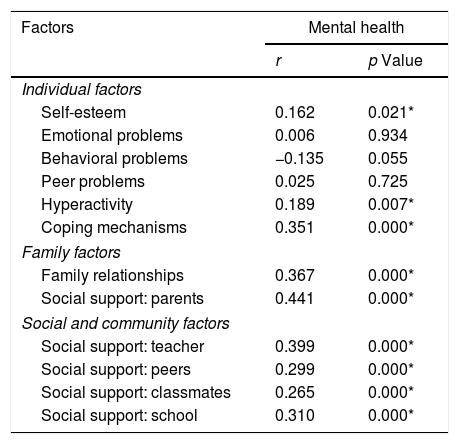The aim of this study was to describe patterns and potential factors of mental health, including emotional, psychological, and social wellbeing among Indonesian adolescents. A descriptive, cross-sectional design was implemented. The sample consisted of 203 junior high school students from four schools (private and public schools) in Bali. Participants completed a one-time, self-report questionnaire on mental health and individual, family, and social community factors. Descriptive, pearson correlation, and logistic regression were used for the analysis. Approximately 44.3% of adolescents were flourishing, 42.4% had moderate mental health, and 13.3% were languishing. Almost all adolescents had high emotional, psychological, and social wellbeing. Self-esteem, behavioral problems, strength, hyperactivity, coping mechanisms, family relationships, social support from parents, teachers, peers, and classmates were perceived as contributing to adolescents’ mental health. Adolescents individuals need to develop adaptive coping abilities to deal with events positively. The involvement of parents and proximity between peers and school environments are needed to strengthen adolescent mental health. There needs to be a comprehensive between adolescents, family, and community as well as interventional strategies and policy directions to help adolescents maintain their mental health.
Journal Information
Vol. 30. Issue S7.
3rd Udayana International Nursing Conference.Global Health: Escalating Evidence Transformation into Practice
Pages 111-116 (December 2020)
Vol. 30. Issue S7.
3rd Udayana International Nursing Conference.Global Health: Escalating Evidence Transformation into Practice
Pages 111-116 (December 2020)
Mental health and related factors among adolescents
Visits
4
a Doctoral Student on Faculty of Nursing, Universitas Indonesia, Indonesia
b Division of Mental Health and Psychiatric Nursing, Department of Nursing, Faculty of Medicine, Universitas Udayana, Indonesia
c Department of Mental Health Nursing, Faculty of Nursing, Universitas Indonesia, Indonesia
d Department of Psychiatric, Faculty of Medicine, Universitas Indonesia, Indonesia
e Department of Biostatistic, Faculty of Public Health, Universitas Indonesia, Indonesia
Article information
Abstract
Full Text
Bibliography
Download PDF
Statistics
Tables (4)
Table 2. Related factors (individual, family, and social community factors) characteristics of participants (n=203).
Table 3. Related factors (individual, family, and social community factors) of mental health (n=203).
Table 4. Regression for related factors with mental health of participants (n=203).
Show moreShow less
Abstract
Keywords:
Social support
Well-being
Mental health
Adolescent
These are the options to access the full texts of the publication Enfermería Clínica
Subscriber
Subscribe
Purchase
Contact
Phone for subscriptions and reporting of errors
From Monday to Friday from 9 a.m. to 6 p.m. (GMT + 1) except for the months of July and August which will be from 9 a.m. to 3 p.m.
Calls from Spain
932 415 960
Calls from outside Spain
+34 932 415 960
E-mail










